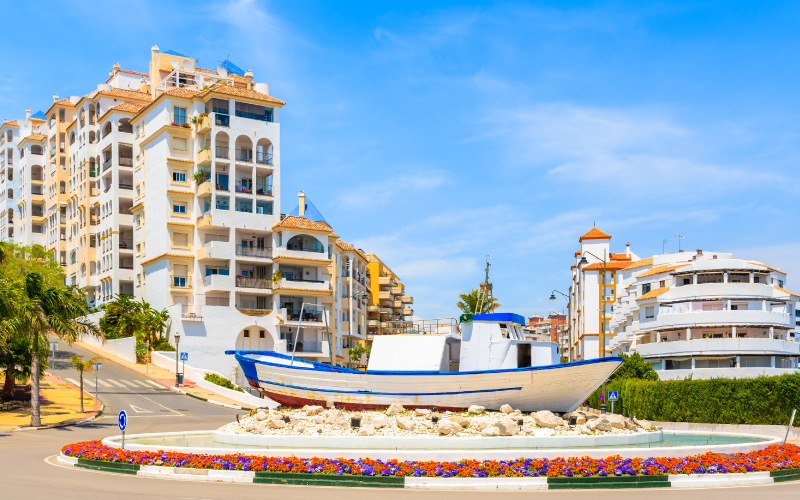Estepona has become one of the most popular investment areas of la Costa del Sol due to its growing real estate business and because it has all the necessary and looked-for elements when you’re interested in the purchase of a property. You can enjoy fantastic weather and perfect temperatures for more than 320 days a year. You will find more than 13 miles of beautiful beaches together with sheltered restaurants where you will be able to enjoy the lovely Mediterranean food and traditions and relax.
Now, and given the high-quality road connections and highway, Estepona is one of the best places to buy a property.
The first thing you need to know about buying a property in Estepona is that you will not regret it. Once you become a resident of Estepona, you will be able to enjoy its beautiful town centre, pretty streets decorated with colourful flowers, murals, museums, and traditional Spanish culture. You will certainly gain an excellent lifestyle and quality of life.
In order to buy a property in Estepona, you will need to take into account several things
-
NIE number
To buy a property you need to obtain your foreigner identification called NIE number. The NIE is an all-purpose identification number in Spain. You need it for everything that involves a “tramite” or official process in Spain.
For example, you will need a NIE number to purchase a property, open a bank account, buy a car, get connected to the utilities of the property, etc.
This personal number can be requested through the Spanish Police or through the Spanish Embassy in your country. In addition, if you wish, you can grant power of attorney to your lawyer in Spain, to request it on your behalf.
-
Taxes and expenses of the Title Deed
The taxes and expenses arising from the signature of the Title Deed must be paid. If you decide to buy a new development property, you will have to pay 10% VAT together with 1,2% stamp duty tax. If you opt for a resale property, the corresponding tax, the transfer tax, is 7%.
-
Notary and Land Registry expenses
Also, Notary and Land Registry expenses will have to be paid. The calculation of notary fees in Spain is regulated by Spanish law.
Together with this, every year you have to pay a local tax for the property, also known as IBI, and garbage tax.
-
Non-resident income tax
Also, the non-resident income tax will have to be paid. This is a direct tax for the benefit obtained in Spanish territory by individuals and not resident citizens in Spain, even if the property is empty. If you also rent your Spanish property and you are a non-resident, you must pay the non-resident rental tax.
-
Land Registry of Estepona
When looking for the best purchase in Estepona, the most important matter to verify is that the property is registered in the corresponding Land Registry of Estepona, and that it was legally built therefore having obtained the First Occupancy Licence, also known as “LPO” in Spain. The property needs to be fully legalised before depositing because, unfortunately, there are many illegally constructed properties on la Costa del Sol.
There are some older properties built before 1986 that were not granted with the “LPO” because it was not an obligation at the time. In these cases, you will need to make sure you obtain a non-urbanistic infringement certificate. This certificate will provide information about the urbanistic situation of the property and if the property has been constructed illegally against the urbanistic and urban laws.
-
Debts on the property
In addition to this, it is important to verify with the community of owners if there are any debts on the property you are interested in purchasing. If there are, they will need to be paid 100% by the owner at the time before your purchase. The same applies to the IBI and Garbage tax. The public administration that takes care of these taxes in Spain is called “Patronato de recaudación provincial de Málaga”, they have accountability of all the properties in Spain and if there are any debts, they will forward it to the owner of the property. For this reason, before completion, the seller must pay for all the debts.
In conclusion, when you’re interested in buying a property in Estepona, first contact your lawyer, they will make sure it’s a safe investment as they will do their due diligence on the above steps. If the property is legally constructed, and your location is well chosen, you will encounter yourself with one of the best investments you can make in la Costa del Sol. The cost of living is much cheaper than in other areas as well as the rentals, so Estepona has also become a great alternative not only for retired people but also for young people who wish to establish and live permanently in la Costa del Sol.
Don’t forget to follow us on social media to keep up to date with all the latest news, Facebook, LinkedIn and Instagram.
We look forward to seeing you in the next articles!

